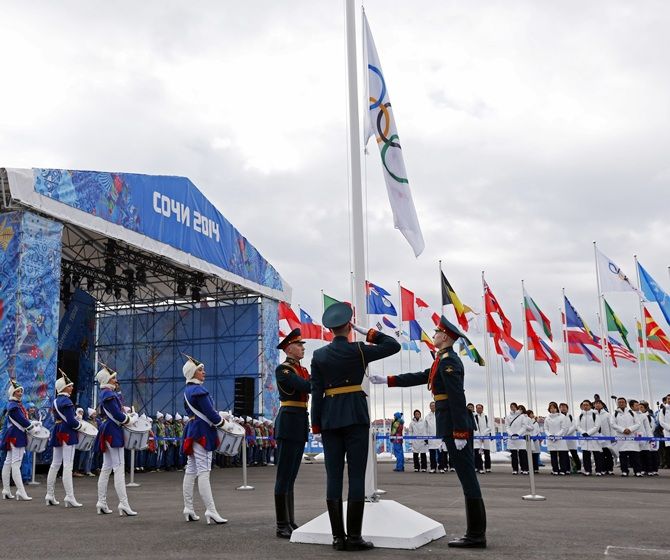 Russian President Vladimir Putin attends the opening ceremony of the Sochi Winter Olympics on Friday determined to prove his doubters wrong after militant attacks, a row over gay rights and ballooning costs overshadowed preparations.
Russian President Vladimir Putin attends the opening ceremony of the Sochi Winter Olympics on Friday determined to prove his doubters wrong after militant attacks, a row over gay rights and ballooning costs overshadowed preparations.
Putin has staked his reputation on hosting a safe and successful Games in the Black Sea resort of Sochi, where a three-hour spectacle before 40,000 spectators at the new Fisht Stadium will signal the start of the full sporting programme.
Some 37,000 security personnel are on high alert over threats by Islamist militant groups based in the nearby north Caucasus region to attack the February 7-23 Games.
Separatist guerrillas seeking an independent Islamic state in Chechnya and neighbouring regions of southern Russia have vowed to disrupt the Olympics, which they say are taking place on land seized from Caucasus tribes in the 19th century.
Despite a "ring of steel" around venues, Russian forces fear a woman suspected of planning a suicide bombing may have slipped through.
Security analysts believe that an attack is in fact more likely to occur elsewhere in Russia to humiliate Putin, who launched a war to crush a Chechen rebellion in 1999.
Twin suicide bombings killed at least 34 people in December in Volgograd, 400 miles (700 km) northeast of Sochi.
Deputy Prime Minister Dmitry Kozak told reporters in Sochi that Russian security services were working with colleagues from Europe and North America to minimise the risk of attack.
"There is no reason to believe that the level of danger in Sochi is greater than at any other point on the planet, be it Boston, London, New York or Washington," he said.
A senior US security official said earlier this week that Washington had issued a warning to airports and some airlines flying to Russia for the Olympics to watch for toothpaste tubes that could hold ingredients to make a bomb on a plane.
The official did not say why such a specific warning was issued now. Airlines have long been aware of the dangers of bombs being made on aircraft from liquids smuggled aboard, and have limited the carriage of liquids and pastes by passengers.
In addition to fears over security, Russia, hosting the Winter Games for the first time, has been under fire since the government passed legislation last year which critics say curtails rights of homosexuals and discriminates against them.
Putin has defended the law as protecting minors and said homosexuals would not face discrimination at the Sochi Olympics.
Organisers and many competitors have said they hoped that the thrills and spills on ice and snow in Sochi, and at the mountain base 40 km (25 miles) to the northeast, would take centre stage once the Games were in full flow at the weekend.
"I don't really feel like the Olympics is a place for that kind of politics ... I think it's a place for sports and a place for cultures to put aside their differences and compete," said veteran US Alpine skier Bode Miller.
The 36-year-old, winner of the men's Super Combined gold medal in Vancouver four years ago, also said the issues surrounding Sochi were "no more political than the ones in China (in 2008) or Olympics as far back as you can remember."
Canada was already talking up its medal prospects.
"Canada is here to compete and win," said Canadian Olympic Committee (COC) head Marcel Aubut. "Our aim is to contend for the number one spot in overall medals won.
"We are not here to participate, we are here to win."
Traditional winter sports powerhouse Russia won just three gold medals four years ago, compared with Canada's 14, and is hoping for a marked improvement on home turf.
Russian organisers launched a robust defence of Sochi, which cost an estimated $50 billion (30 billion pounds) to stage, making it the most expensive Games - summer or winter - in history.
"Russia has created a wonderful example to follow for future organisers of Olympic Games," Dmitry Chernyshenko, head of the local organising committee, told reporters on Thursday.
He was addressing alarm among members of the International Olympic Committee (IOC) that the costs associated with Sochi could deter others from bidding to host the event.
Officials said much of the infrastructure built for 2014 was designed to be used long after the Games had finished, and the plan was to turn Sochi into a year-round resort, international sports centre and amusement park.
Image: The Olympic flag is raised by Russian soldiers during the welcoming ceremony for the teams in the Athletes Village
Photograph: Alexander Demianchuk/Reuters












 © 2025
© 2025